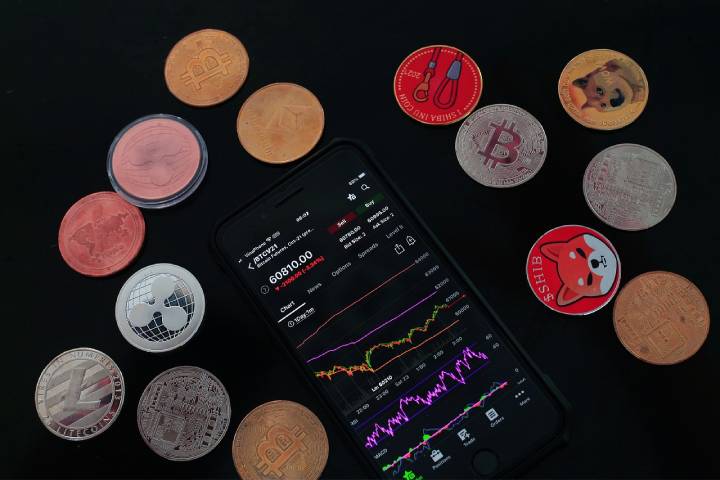Bitcoin
What are Types of Cryptocurrencies: a Complete Guide
What are Types of Cryptocurrencies: a Complete Guide, First cryptocurrency, Coins and tokens, Altcoins, Stablecoins, Governance tokens

Different types of cryptocurrency differ in certain features, areas of application, and efficiency. When choosing the right option for digital assets for investments, it is essential to consider many subtleties since the possibilities of investments and earnings on investments directly depend on this.
The first cryptocurrency was Bitcoin, but in recent years, many new types of digital assets that differ in their features have appeared. For example, you can easily buy WBT and other investments on favorable terms. A comprehensive market assessment will give an idea of the basic concepts and features of the work of decentralized technologies by the established standard norms and requirements for each user.
Table of Contents
1. First cryptocurrency
All types of cryptocurrency work on a similar principle but differ significantly. Bitcoin was first launched in 2009. Since then, it has been the most sought-after and profitable cryptocurrency. This is a general-purpose crypto that can be used to pay for various services and goods and used for a wide range of tasks.
Bitcoin can almost wholly replace fiat money due to its simplicity, accessibility, and understandability for most people. In addition to Bitcoin, there are other types of cryptocurrencies: tokens, coins, altcoins, and stablecoins.
2. Coins and tokens
Coins and tokens have a similar value but differ in technical implementation. Among the distinguishing characteristics, attention should be paid to the following:
- Coins are a native medium of exchange used with specific cryptocurrencies developed using Blockchain technology.
- Tokens are coins already created based on their technology, so they have a different underlying implementation technology.
Despite the difference in implementation, these types of cryptocurrencies have similar properties and use cases, so they are actively used to perform various payment transactions.
3. Altcoins
In addition to Bitcoin, there are other types of cryptocurrencies called altcoins. Ethereum is one of the most popular altcoins. It was launched in 2015 but had high popularity and fame on par with the first cryptocurrency.
Among the critical characteristics of Ethereum are the following:
- high flexibility and security of digital assets of different types;
- interaction with various technologies;
- a system of smart contracts, which are characterized by a high level of manageability and security;
- development of applications of various levels using Blockchain technology;
- openness and anonymity of data placement in the system.
Currently, based on Ethereum, many projects, applications, and smart contracts have been developed, which are built based on Blockchain technology. Ethereum also has a cryptocurrency that can be used as a payment instrument.
When wondering what types of cryptocurrency are there, you should pay attention to other altcoins. For example, Solana, Polkadot, and many others are among the most popular projects capable of performing complex transactions.
4. Stablecoins
Many cryptocurrencies are unstable. Their value constantly changes, making them a complex investment tool, bringing significant risks when investing. Stablecoins were created to tie cryptocurrencies to real money to acquire a specific value. By linking to real fiat money, the value of stablecoins is much easier to predict.
As a rule, the value of a coin can change within a few percent, which is not so critical for investors, providing a stable profit. The cryptocurrency market is actively developing, so stablecoins are constantly increasing. At the same time, this digital asset has all the advantages of decentralized technologies and real money.
5. Different types of tokens

Different types of cryptocurrencies are created to finance various operations in specific programs. Therefore, they are referred to as utility tokens. There are such types of similar tokens:
- Governance tokens. Such tokens can be used to manage the company. For example, a particular DeFi project may issue a certain number of such governance tokens, which will help purchase shares of this company in the future. Participants with more similar coins have higher voting power in decision-making.
- Non-fungible tokens. Such tokens are unique and one of a kind. Therefore, regardless of their features and origin, they allow you to get the maximum profit. The NFT market is actively developing and offers many original digital objects that are real works of art.
By understanding how many types of cryptocurrency there are, you can choose the best option for investment. There are a variety of investment options in the crypto market. It is crucial to regularly study all the latest news to understand the peculiarities of the development of the cryptocurrency market.
Bitcoin
Stocks or Currency for Investors: Bitcoin
The debate surrounding Bitcoin’s classification as either stocks or currency is a topic of great interest. Bitcoin stocks or currency for investors.

The debate surrounding Bitcoin’s classification as either stocks or currency is a topic of great interest. This article explores the potential of Bitcoin from both perspectives. Elevate your Bitcoin trading game by accessing the wealth of information and resources at https://quantum-code.app/, where traders can develop their skills and unlock their full trading potential.
1. Bitcoin as a Currency for Investors
Bitcoin has gained significant attention as a potential currency for investors, offering several advantages in the digital economy. One of the key advantages of Bitcoin as a currency is its decentralized nature, operating without the need for intermediaries such as banks or governments. This decentralization gives users greater autonomy over their finances and reduces their dependence on traditional financial systems.
Another advantage of Bitcoin as a currency is its potential to protect against inflation. Unlike traditional fiat currencies, which can be affected by inflationary pressures, Bitcoin has a limited supply. With a maximum cap of 21 million coins, Bitcoin’s scarcity contributes to its value proposition as a hedge against inflationary pressures that can erode the purchasing power of traditional currencies.
Furthermore, Bitcoin holds the potential for global adoption. As a digital currency, it enables seamless cross-border transactions without the need for currency conversions or intermediaries. This feature makes Bitcoin particularly attractive for individuals and businesses engaged in international trade, eliminating the friction associated with traditional payment systems.
However, Bitcoin as a currency also poses certain risks and challenges. One significant challenge is the high volatility and price fluctuations it experiences. The value of Bitcoin can fluctuate dramatically within short periods, making it a risky investment for those seeking stability. Investors considering Bitcoin as a currency must carefully assess their risk tolerance and be prepared for potential losses.
Another concern is the regulatory landscape surrounding Bitcoin. As governments and financial authorities strive to understand and regulate cryptocurrencies, there are legal uncertainties and evolving regulations that can impact the use and acceptance of Bitcoin as a currency. Investors need to stay informed about the changing regulatory environment to make informed decisions regarding the adoption of Bitcoin as a currency.
Security is also a critical consideration when dealing with Bitcoin as a currency. While blockchain technology provides inherent security features, Bitcoin wallets, and exchanges can be vulnerable to hacking and cyber-attacks. Investors must take necessary precautions to secure their Bitcoin holdings and choose reputable platforms for transactions.

2. Bitcoin as Stocks for Investors
Another perspective on Bitcoin for investors is to view it as a form of stock or digital assets. While traditionally stocks represent ownership in a company, Bitcoin can be seen as a digital asset that holds investment potential.
One of the similarities between Bitcoin and traditional stocks is the opportunity for investment and potential value appreciation. Bitcoin’s price has experienced significant growth over the years, attracting investors looking for high returns. As more individuals and institutions recognize Bitcoin’s value and potential, its market demand and price may continue to rise.
However, it’s important to note that Bitcoin as a stock also comes with its own set of risks and challenges. The market for cryptocurrencies, including Bitcoin, is highly volatile and subject to sudden price fluctuations. The value of Bitcoin can change dramatically within short periods, making it a speculative investment that requires careful consideration.
Unlike traditional stocks, Bitcoin also lacks regulatory oversight. While this aspect may be appealing to some investors seeking a decentralized and independent investment, it also exposes them to potential market manipulation and fraudulent activities. Without strict regulations and oversight, investors need to be cautious and conduct thorough research before entering the Bitcoin market.
Additionally, the limited understanding and education surrounding Bitcoin and cryptocurrencies pose challenges for investors. The technology behind Bitcoin, such as blockchain, can be complex for individuals unfamiliar with the underlying mechanisms. It’s crucial for investors to educate themselves about Bitcoin, its market dynamics, and the factors that can influence its price movements.
Investing in Bitcoin as a stock requires careful consideration of various factors. Investors should conduct market research and analysis to identify trends and make informed investment decisions. Timing is also critical, as entering the market at the right moment can significantly impact potential returns. Due diligence, risk assessment, and staying informed about regulatory changes and industry developments are essential for managing investments in Bitcoin as stocks.
Conclusion
As the financial landscape continues to evolve, Bitcoin offers unique opportunities as both a currency and a form of stock. Understanding its advantages, risks, and the considerations involved can help investors make informed decisions about incorporating Bitcoin into their investment strategies.
-

 Instagram2 years ago
Instagram2 years agoBuy IG likes and buy organic Instagram followers: where to buy them and how?
-

 Instagram2 years ago
Instagram2 years ago100% Genuine Instagram Followers & Likes with Guaranteed Tool
-

 Business4 years ago
Business4 years ago7 Must Have Digital Marketing Tools For Your Small Businesses
-

 Instagram3 years ago
Instagram3 years agoInstagram Followers And Likes – Online Social Media Platform
















